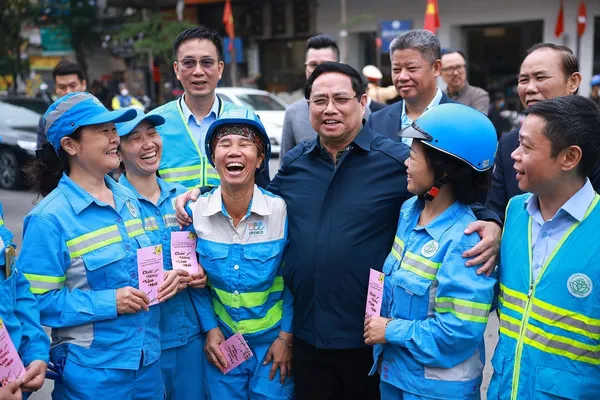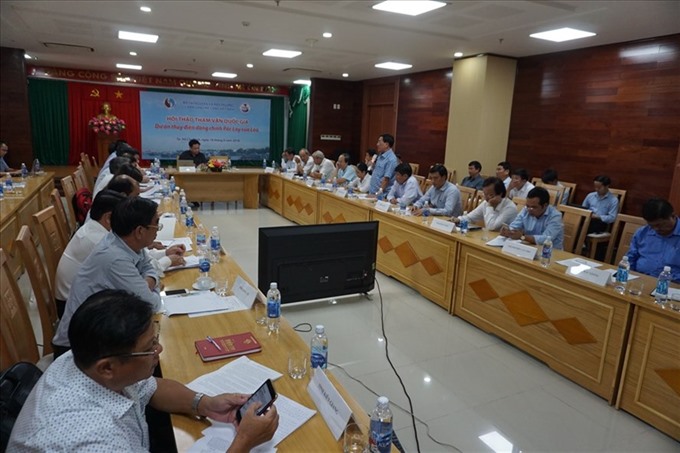 Society
Society

The Mekong River Commission organised a consultation workshop in HCM City yesterday for the Pak Lay hydropower project proposed on the Mekong’s mainstream in Xayaburi Province in north-western Laos.
 |
| The Mekong River Commission organised a consultation workshop in HCM City yesterday for the Pak Lay hydropower project proposed on the Mekong’s mainstream in Xayaburi Province in north-western Laos.– VNA/VNS Photo |
HCM CITY – The Mekong River Commission organised a consultation workshop in HCM City yesterday for the Pak Lay hydropower project proposed on the Mekong’s mainstream in Xayaburi Province in north-western Laos.
“The prior consultation process has distinct value in that it is the only basin-wide water diplomacy platform for publicly evaluating hydropower projects proposed for the Mekong mainstream with potential adverse trans-boundary impacts,” Lê Đức Trung, head of the commission office in Việt Nam, said.
The proposed project sits downstream of the currently under-construction Xayaburi hydropower station and is 241km upstream of Vientiane, the country’s capital.
The run-of-river dam will operate year-round and produce 770MW of electricity.
Designed to discharge 6,101cu.m per second, the power plant is intended mainly for power generation for domestic supply.
The project’s total cost is estimated at US$2.1 billion with the construction expected to start in 2022 and commercial operation in 2029.
Power China Resources Ltd has been named as the developer.
“On June 13, 2018, the Lao government, through its Lao National Mekong Committee, notified the Mekong River Commission Secretariat of its intention to undertake the formal process of prior consultation on the Pak Lay hydropower project,” Lê Thị Hương from the MRC office said.
“The notification includes the detailed description of the planned project for the MRC Secretariat to review and take further action to inform the other member countries about the project’s scope and other requirements under the prior consultation process.”
The MRC’s joint committee working group on the Procedures for Notification, Prior Consultation and Agreement (PNPCA) convened its first meeting last month to hear and discuss several key issues that require advanced proper attention and common understanding and agreement to ensure successful implementation of a six-month prior consultation process of the proposed project with the aim of increasing the joint benefits and co-operation between the member countries and the secretariat.
The MRC has scheduled one regional stakeholder forum early next year and a field visit to the project site to exchange and share information, investigate the site, and discuss and document legitimate concerns.
The commission is now implementing the prior consultation process.
The consultation is conducted by the MRC joint committee, a higher governance body comprising one senior government official not below the level of department head from each member country, with technical and administrative support by the secretariat and the joint working group.
The prior consultation is part of the MRC’s procedural rules on co-operation on water use of the Mekong mainstream governed by the PNPCA.
Under the procedures, any infrastructure project using the mainstream water during the dry season within the same basin, as well as during the wet season between two basins, must undergo the prior consultation process.
Applicable projects include large-scale irrigation and hydropower development which may cause significant impacts on the environment, water flow and quality of the Mekong mainstream.
In the prior consultation process, with technical and administrative support from the secretariat, the notified member countries will review the technical aspects of the proposed project, assess any potential trans-boundary impacts on the environment and livelihoods along the riparian communities, and suggest measures to address those concerns.
The member countries aim to come to an agreement on how the consulted case should proceed. It is not meant to approve or disapprove the proposed project.
This process normally lasts six months, but it could be extended further, if required, by the joint committee.
The prior consultation is one of the three procedures required for the development of different types of water-use projects in the lower Mekong basin as specified in the PNPCA established under the 1995 Mekong Agreement.
On Thursday the commission’s 5th Regional Stakeholder Forum will be held in Vientiane to review the plans for the Pak Lay hydropower project. — VNS




